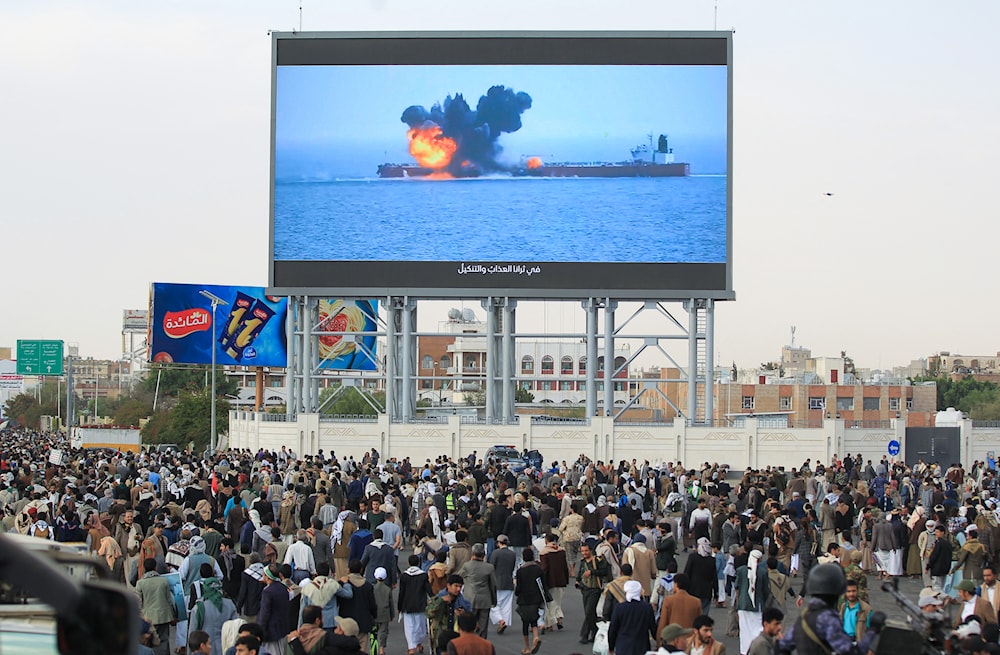Yemen rejects US pressure, vows to maintain Red Sea operations
The Foreign Minister in the Sanaa-based government, Jamal Amer, says he had not been informed of any message Iran might have conveyed to the Yemeni envoy in Tehran.
-
 Images of a fireball exploding on a cargo ship are shown on a giant screen during a protest in Sanaa, on March 17, 2025 (AFP)
Images of a fireball exploding on a cargo ship are shown on a giant screen during a protest in Sanaa, on March 17, 2025 (AFP)
Yemen will not scale back its operations against Israeli shipping in the Red Sea in response to US military pressure or appeals from allies such as Iran, the Foreign Minister in the Sanaa-based government, Jamal Amer, told Reuters on Monday.
His remarks came after the US launched an aggression with a series of strikes on Yemeni territory after the Yemeni Armed Forces announced last week that they were resuming attacks on Red Sea shipping in support of the Palestinian people in Gaza.
US President Donald Trump stated on Monday that he would hold Iran accountable for any attacks carried out by Yemen.
"There will be no talk of any dialing down of operations before ending the aid blockade in Gaza. Iran is not interfering in our decision but what is happening is that it mediates sometimes but it cannot dictate things," Amer explained.
Speaking from Yemen’s capital, Sanaa—recently targeted by US strikes—Amer said he had not been informed of any message Iran might have conveyed to the Yemeni envoy in Tehran.
While other international actors had urged de-escalation, he asserted that "Yemen is at war with the US and that means that we have a right to defend ourselves with all possible means, so escalation is likely."
Since returning to office for a second term in January, Trump has intensified his “maximum pressure” campaign of sanctions on Iran, having previously withdrawn the US from the 2015 nuclear agreement between Tehran and six major world powers.
"(The US) is threatening Iran and hitting Yemen. Now all scenarios are possible. We will do what they will do to us. If they are hitting us from (US aircraft carrier USS Harry S.) Truman, we will retaliate by hitting Truman," the Yemeni minister warned.
On March 12, the YAF declared the resumption of attacks on Israeli-linked vessels passing through the Red Sea, citing "Israel’s" refusal to end its blockade on the Gaza Strip.
Since November 2023, the YAF carried out more than 100 attacks in a show of solidarity with Gaza. They temporarily suspended their operations when a ceasefire took effect in January.
According to Amer, the YAF had initially focused exclusively on targeting Israeli vessels, but US military action had escalated the situation.
The latest wave of US airstrikes, which began on Saturday, has struck the Yemeni capital and expanded across several areas, resulting in dozens of casualties.
Amer also noted that certain European Union countries had urged Sanaa to avoid further escalation, and in response, the latter had sought to reassure them that their targets were exclusively Israeli ships.
Regarding Saudi Arabia, Amer said it had not intervened militarily, nor had other Gulf states. He acknowledged the significance of this stance, warning that any military involvement by Gulf nations could draw them into the conflict.
"If any aircraft or base is used against us then we will escalate and we will defend ourselves, but if they (Gulf states) continue to be neutral we will stay away," he stressed.
Read more: Continued US aggression will push Yemen to adopt 'painful options'

 3 Min Read
3 Min Read








